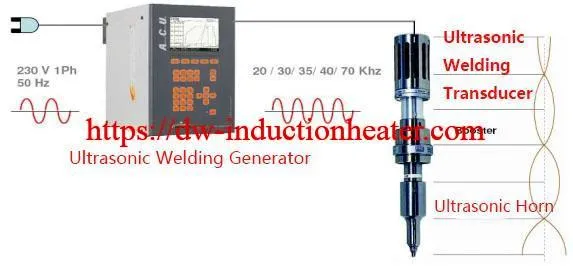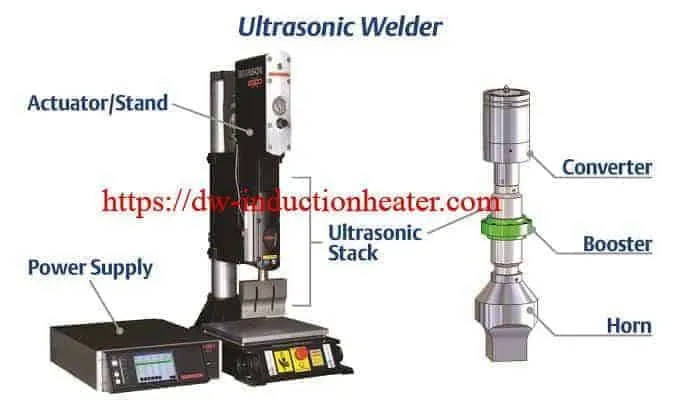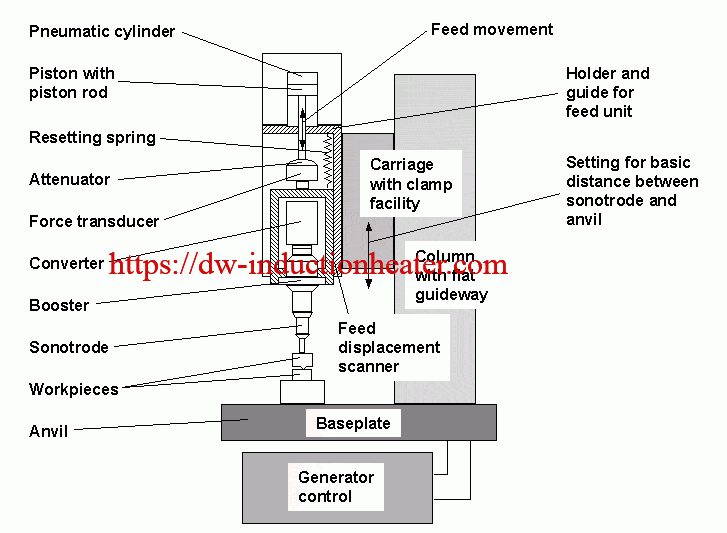Ultrasonic Welding Principle/Theory
Ultrasonic welding, also known as ultrasonic bonding, is a process in which high-frequency (ultrasonic) sound waves are applied to two or more workpieces that are being held together under pressure to fuse them into a single piece. Commonly used to join plastic parts—especially those made of different types of plastic—ultrasonic welding permanently bonds the individual workpieces without the need for adhesives or mechanical fasteners.

Ultrasonic welding is an industrial technique whereby high-frequency ultrasonic acoustic vibrations are locally applied to workpieces being held together under pressure to create a solid-state weld. It is commonly used for plastics and metals, and especially for joining dissimilar materials. In ultrasonic welding, there are no connective bolts, nails, soldering materials, or adhesives necessary to bind the materials together. When applied to metals, a notable characteristic of this method is that the temperature stays well below the melting point of the involved materials thus preventing any unwanted properties which may arise from high temperature exposure of the materials.

How does ultrasonic welding work?
Every ultrasonic welding operation will vary based on the plastic materials being joined, the shape of the workpieces, and other factors. However, the overall process is generally the same. The parts being sonically welded are fitted together and sandwiched between a metal “nest”, which holds them in place, and a metal sonotrode, or horn.
The horn is connected to a transducer, which creates extremely high speed vibrations; the horn transfers this vibratory motion to the workpieces it is pressed against. The vibrations cause the plastic to melt slightly, and pressure applied by the nest fuses them together, creating a joint. Typically, the interface area where the two parts come together is specially designed to facilitate the melting and bonding processes. After the parts are joined properly, the vibrations stop and the plastic cools very rapidly, creating an incredibly strong bond.

[pdf-embedder url="https://dw-inductionheater.com/wp-content/uploads/2020/08/ultrasonic-welding-principle-and-process.pdf" title="ultrasonic welding principle and process"]
[wpforms id="3947"]
 Ultrasonic welding is an industrial technique whereby high-frequency ultrasonic acoustic vibrations are locally applied to workpieces being held together under pressure to create a solid-state weld. It is commonly used for plastics and metals, and especially for joining dissimilar materials. In ultrasonic welding, there are no connective bolts, nails, soldering materials, or adhesives necessary to bind the materials together. When applied to metals, a notable characteristic of this method is that the temperature stays well below the melting point of the involved materials thus preventing any unwanted properties which may arise from high temperature exposure of the materials.
Ultrasonic welding is an industrial technique whereby high-frequency ultrasonic acoustic vibrations are locally applied to workpieces being held together under pressure to create a solid-state weld. It is commonly used for plastics and metals, and especially for joining dissimilar materials. In ultrasonic welding, there are no connective bolts, nails, soldering materials, or adhesives necessary to bind the materials together. When applied to metals, a notable characteristic of this method is that the temperature stays well below the melting point of the involved materials thus preventing any unwanted properties which may arise from high temperature exposure of the materials.

 [pdf-embedder url="https://dw-inductionheater.com/wp-content/uploads/2020/08/ultrasonic-welding-principle-and-process.pdf" title="ultrasonic welding principle and process"]
[wpforms id="3947"]
[pdf-embedder url="https://dw-inductionheater.com/wp-content/uploads/2020/08/ultrasonic-welding-principle-and-process.pdf" title="ultrasonic welding principle and process"]
[wpforms id="3947"]
